Wondering how to use WeChat for your business?
The super app is the single largest social network in China, and it’s gaining momentum elsewhere, too.
In China, where the majority of WeChat users live, the platform is known as Weixin.
Weixin was first released as a messaging app in 2011 by parent company Tencent. It quickly grew into an “everything app,” connecting users to gaming, ridesharing, shopping, and even government services, along with friends and family.
WeChat users can now do everything from posting videos to filing for divorce on the app.
They can also synchronize their posts, called “Moments,” with Facebook and Twitter—social networks that are still banned in Mainland China (along with Instagram and YouTube). Nearby competitors include Japan’s Line and South Korea’s Kakao Talk. However, there’s also competition from Whatsapp and Tik Tok.
Many non-Chinese brands have used WeChat’s Mini Programs and platform features to break into the Chinese market. And now that you no longer need a Chinese business license to create an account, more businesses are expected to follow.
So, how does WeChat work? Read on for app stats, WeChat marketing strategies, and more.
WeChat demographics and stats
WeChat is notoriously guarded when it comes to sharing stats about its users and demographics. We’ve collected the most authoritative figures out there.
WeChat demographics
- More than 1.1 billion monthly active users (MAUs) globally. For comparison, Facebook has 2.32 billion MAUs. However, WeChat achieved the one-billion MAU milestone one year faster than Facebook did.
- Many WeChat users have two or more accounts because the platform only allows 5,000 contacts per personal account.
- More than one billion registered WeChat users are located in China.
- Outside of China, there are 70 million registered WeChat accounts, according to a recent presentation by Tencent’s president Martin Lau.
- In China, WeChat is most popular with people between 26- and 35-years-old, according to a survey by the China Academy of Information and Communications Technology (CAICT).
- While seniors are WeChat’s smallest age group in China, WeChat accounts for 80% of data use for one-third of users 60-years-old and up.
- In 2017, WeChat reported 50 million monthly active senior users.
WeChat usage stats
- Chinese people spend more than one-third of their online time on WeChat.
- According to the CAICT survey, WeChat is most frequently used application among 87.6% of users.
- More than 81.5% of users spend more than an hour on the app everyday.
- On average, more than 750 million Chinese users read friend posts on Moments each day.
- Globally, approximately 23% of Internet users check WeChat at least once per day. Only Facebook, YouTube, and Whatsapp (in descending order) rank higher.
- In 2017, WeChat users were sending an average of 38 billion messages per day, up 25% from the previous year. Users also made an average of 6.1 billion voice messages, and 205 million calls every day.
- An average of 68 million videos were posted to Moments every day in 2017.
WeChat Mini Programs stats
- In 2018, more than 580,000 Mini Programs were created a year within its launch, attracting more than 170 million daily active users.
- Mini Programs now cover more than 200 service sectors.
- More than 12 Mini Programs had more than one million daily active users in 2018.
- According to WalktheChat analysis, 56.9% of Mini Programs outside of China are in Europe and Russia, followed by South East Asia, Oceania, South America, and North America with 4.4%.
WeChat Pay stats
- WeChat’s digital payment service is currently available in more than 20 countries.
- WeChat Pay has 900 million monthly active users.
- More than 100 million people have purchased WeChat personal finance products.
- Transaction value of WeChat Pay in Hong Kong increased more than 10x in 2018.
- Pay services are now available to users in 49 markets outside of Mainland China.
- In China, WeChat Pay is used most in supermarkets and convenience stores, followed by online shopping, food, travel, entertainment, beauty, and other sectors.
WeChat Work stats
- Roughly 80% of the top 500 businesses in China have become corporate users on WeChat Work, WeChat’s answer for Slack and other workplace collaboration platforms.
How to use WeChat for business
These are just a few of the ways companies can use WeChat for business in China and beyond.
WeChat Advertising
WeChat offers a few types of ads on its platform. Banner ads can be placed at the bottom of articles. Moments ads are similar to in-feed ads placed on Facebook and Instagram.
WeChat Store
Since WeChat does not allow links to external platforms, a WeChat Store is a brand’s primary way of obtaining sales through the app.
Mini Programs
WeChat Mini Programs are basically apps within the app. Brands can use Mini Programs to offer special promotions, share games, and even recreate apps they offer outside of the platform. For instance, the Chinese bike-share company Mobike has a Mini Program that allows people to rent its bikes without having to leave WeChat.
WeChat influencer marketing
Known on WeChat as Key Opinion Leaders (KOLs), WeChat influencers can help brands break into new markets by sharing sponsored posts. There’s currently no fixed rate for influencer partnerships on WeChat.
How to create a WeChat account for business
Creating an Official WeChat Account—also known as a WeChat business account—requires a fair amount of preparation. Our step-by-step guide walks you through the process, offering tips along the way.
1. Go to the WeChat Official Accounts Platform.
2. Click Register.
3. Choose either Service or Subscription Account. Make sure you review the differences between the two before making your decision. It’s not possible to switch later.
Subscription account
Facebook Pages are the best analog for WeChat’s Subscription Accounts. Subscription Accounts are best if publishing content is your primary WeChat marketing goal. These accounts are nested in the WeChat subscription folder, which means lower exposure.
- Can post one broadcast message per day, and up to six articles
- No push notifications
- Content is searchable and shareable
- Businesses require verification and must use WeChat API
- No support for payments
Service account
WeChat Service Accounts offer admins more customization and platform features, including opening a WeChat Store and creating Mini Programs. Another benefit is that posts are published as updates in users’ chat lists where they have higher visibility.
- Can post four broadcast messages per month, and up to six articles
- Push notifications
- Content is not searchable
- Grants access to WeChat public platform tools, including custom menus
- Payments are supported for verified accounts
4. Complete the basic info form and wait for verification.
5. Select your company’s region.
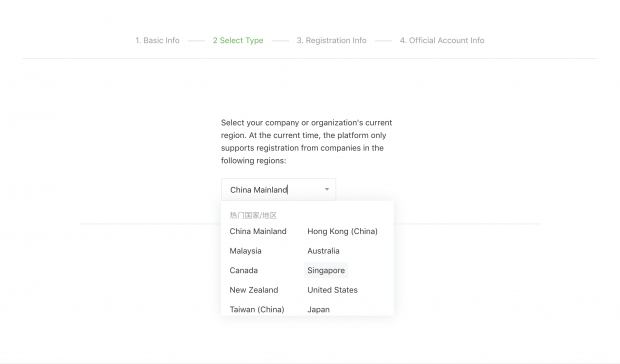
6. Fill in the entity information form.
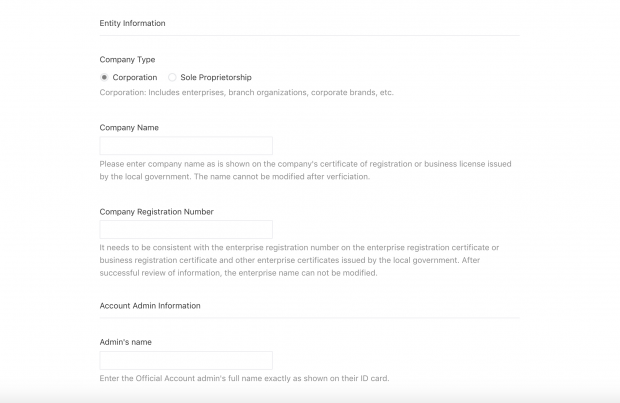
Note: You will need to have a company registration (or business license) number. Make sure the appropriate contact provides this information. The information included here cannot be altered when activating WeChat Pay and other features in the future.
7. Create your WeChat account profile.
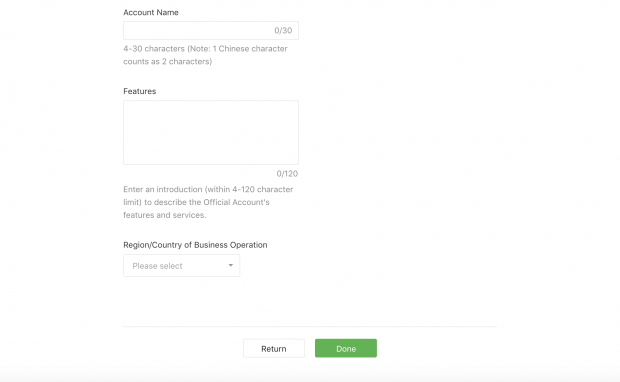
8. Once you have opened your account, apply for verification. You’ll need to provide a completed Verification Letter, Trademark Registration, and other qualifying documents.
6 strategies for WeChat marketing
Beyond WeChat banner and Moment ads, there are many ways to connect with customers on the platform. Here are six WeChat marketing strategies and several brand examples.
Advertise your WeChat account with QR codes
WeChat users can scan QR codes to find users, join, groups and more. And brands have transformed the duo-tone pixelated codes into animated works of art.
Martell Cognac rewards customers’ curiosity with a QR code placed on its website.

Super Mario’s QR code is functional and on-brand.

Mobike’s code manages to deliver its brand proposition and a way to connect in a clever animated GIF.

Create HTML5 campaigns to increase engagement
With custom HTML5 campaigns, brands can host unique experiences from their Official WeChat Accounts. Depending on your WeChat marketing objectives, you could create a survey or quiz to customer leads, or an interactive experience that unlocks promo codes of special information.
To promote a pop-up store and sale at Shanghai’s Cha House and its new perfume, French luxury brand Hermès took advantage of WeChat HTML5 by creating a tailored experience. They invited their WeChat followers to click on a GIF and “unwrap” a perfume bottle. After unwrapping, participants could reserve a visit to the pop-up shop.
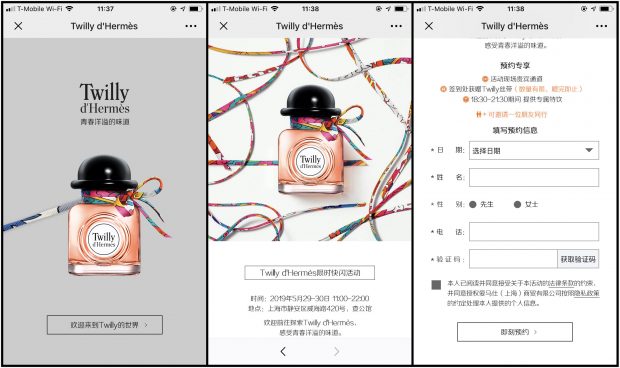
Promote awareness with a branded game
To celebrate the opening of their new office in Shanghai, LxU and xS, created a branded game called Olympig (since 2019 is the year of the pig). Gamers could play three mini-games within the game to rank on the leaderboard.
This could be a fun way to promote products and services, or reinforce brand messaging.
The Olympig Game in the Year of the Pig from LxU Studio on Vimeo.
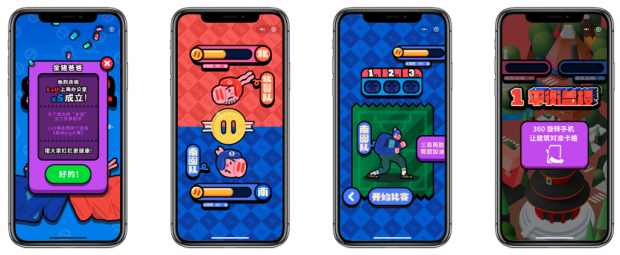
Partner with WeChat influencers to connect with audiences
One of the best ways to introduce your brand to a new audience is with an influencer, or “key opinion leader.”
Influencers have the trust of local audiences. As content creators, they are often dialled-in to what works with their followers and what doesn’t.
For example: Mini Cooper’s WeChat campaign with Chinese blogger Becky Li.
Hailed by her 4.5 million plus followers as the “Goddess of Shopping,” Li has remarkable sway over her audience. Her sponsored WeChat article about Mini Coopers resulted in sales of 100 Mini Cooper Countryman vehicles in under five minutes.
Gucci’s “WhyAre You Scared of Me?” campaign used an artificial intelligence-powered robot as its influencer. The tongue-in-cheek campaign showed that the luxury brand is socially savvy and avant-garde when it comes to technology.

Tell a brand story with a video campaign
In anticipation of the Chinese New Year, skincare brand SK-II took to WeChat to connect daughters with their parents back home.
The “Meet Me Halfway” campaign tapped into the pre-travel anxiety of eight out of 10 single Chinese women, who feel pressured by their parents to get married and start a family whenever they visit home.
On WeChat, the skincare brand used video to tell the stories of three women who wrote letters to ask their parents to meet them halfway, both literally and figuratively. The company also tapped influencers to share their own experiences, encouraging other WeChat users to do the same.
The campaign was one of the most talked about social media initiatives in China, earning 75 million views.
SK-II: Meet Me Halfway (Case Study) from Jason Feng on Vimeo.
Build loyalty with a Mini Program app
For the 2015 Nike Hong Kong Women’s 10K Race, the sports brand created a Mini Program called Nike WeChat+.
The runkeeper companion app offered custom eight-week training programs for participants, performance monitors, news updates, unlockable rewards, and more. After competing in the race, Nike presented each participant with a surprise film showcasing their transformation story.
The initiative earned Nike 192,124,300 impressions and a 92% increase in Nike+ run club followers.
Nike 10k Womens Race 2015 Campaign from John Koay on Vimeo.
In September last year Nike China launched an MVP Mini Program that offers its customers access to products, services, member benefits, on-demand experts, and more.
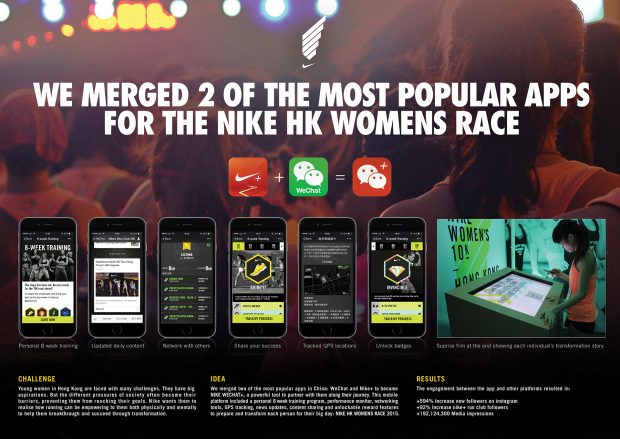
Pro tip: WeChat is the primary social gateway to Chinese audiences. And since most of the platform’s users are based in China, most brands on WeChat are there to reach the Chinese demographic. That means most campaigns are run in Standard Mandarin.
Remember, if you want to reach a new audience, you have to speak their language. Be sure to hire a reputable translator and familiarize yourself with the culture as much as possible.
Send or schedule a photo or text message to your followers on WeChat and respond to their messages from the Hootsuite dashboard. Try it free today.
Get Started
